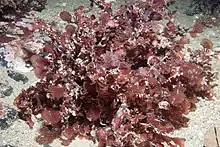| Phyllophora crispa | |
|---|---|
 | |
| Off Rathlin Island in Northern Ireland | |
| Scientific classification | |
| (unranked): | Archaeplastida |
| Division: | Rhodophyta |
| Class: | Florideophyceae |
| Order: | Gigartinales |
| Family: | Phyllophoraceae |
| Genus: | Phyllophora |
| Species: | P. crispa |
| Binomial name | |
| Phyllophora crispa (Hudson) P.S.Dixon | |
Phyllophora crispa is a medium-sized fleshy, marine red alga. This alga forms dense mats of up to 15 cm thickness, which influence environmental factors, thus creating habitat for several associated organisms.[1]
Description
Phyllophora crispa is a perennial seaweed growing up to 15 cm (5.9 in) long.[2] It grows from a short terete stipe. The frond is firm bright red in colour and with flattened parallel sides. It branches dichotomously the tips being rounded. It is cartilaginous with the medulla, the internal parts composed of large compact cells enclosed in two to four layers of smaller cells.[3]
_(14590972807).jpg.webp) Illustration
Illustration
Reproduction
The sexes are, dioecious, that is to be found on separate plants.[3] The reproductive outgrowths occur on the blade surface,[2] the cystocarps are on short stalks on the thallus surface.[4] The tetraspores are arranged in rows on the surface of the stipe is special bladelets.[2]
Habitat
Epilithic, found deep rock pools in the lower littoral[5] and to a depth of 30 m in the sublittoral.[3]
Distribution
Generally common around Ireland, Great Britain as far north as Shetland and the Isle of Man.[5] Recorded also from Iceland, Norway, Portugal, Mediterranean and the Black Sea.[3]
References
- ↑ Schmidt, Neele; El-Khaled, Yusuf C.; Roßbach, Felix I.; Wild, Christian (2021). "Fleshy Red Algae Mats Influence Their Environment in the Mediterranean Sea". Front. Mar. Sci. 8: 721626. doi:10.3389/fmars.2021.721626.
- 1 2 3 Bunker, F.StP. D., Brodie, J.A., Maggs, C.A. and Bunker, A.R.2017. Seaweeds of Britain and Ireland Second Edition Wild Nature Press, Plymouth, UKISBN 978-0-9955673-3-7
- 1 2 3 4 Dixon, P.S. and Irvine, L.M.1977. Seaweeds of the British Isles Volume 1 Rhodophyta. British Museum (Natural History)ISBN 0-565-00781-5
- ↑ Newton, L. 1931 A Handbook of the British Seaweeds. British Museum, London
- 1 2 Hardy, F.G. and Guiry, M.D.2003.A Check-list and Atlas of the Seaweeds of Britain and Ireland. The British Phycological SocietyISBN 0-9527115-16